The Fragmentation[1] Decalogue
An ode to the beauty of the unsolved.
Gunther Van Lany (Student SoT Delta), january 2021.
Inspired by Rudolf Boehm and some other free thinkers[2][3][4]
1.
Your mind is fragmented, so is your thinking.
Don’t avoid thinking that is not in line with your self-image or your body.
You can (try) to think like an ant, a good friend of yours, or a dictator.
This is the true potential of a fragmented mind.
Think beyond the image of yourself,
while acting in line with your self-image.
2.
Any thinking where you have multiple random fragments of a puzzle,
and you found,
that one,
the one that you were always missing,
which makes it all slot together,
when you were not even looking for it,
will feel like serotonin inducing gold.
It is a key reminder to keep all information sources vast and random,
while knowing that great thinking should transcend a serotonin treasure hunt.
3.
Always try to find synonyms because they never say the same.
And what about words that have little synonyms?
‘Obviate, parallel, paradigm, isosceles, pahoehoe, anemometer, sphygnomometer, pyroclastic, enantiomer….’ are some examples often mentioned.
Maybe they are the prime numbers in language?
Language is one of our tools to fragment our world, our mind, our relationships.
Use it wisely.
4.
Now, there is also that other word:
‘Puzzle’.
A word without appropriate synonyms in the English language?
Does a collection of fragments come close?
So, what is the meaning of puzzle?
Or better: when does the puzzle make sense?
It goes without saying that sense and solution are 2 different concepts.
That last piece of the puzzle, yes serotonin again, and the thing is solved, but didn’t it all have more sense when it was incomplete?
5.
Furthermore, there is that other thing with solutions.
When solutions become detached from sense,
our historically unique mindset turns tools from means into ends.
You don’t need to read Ivan Illich[5];
to understand that social media weren’t built to make friends.
To grasp the idea that AI can be very dumb.
Or to see that we are turning both growth and de-growth into ends, instead of means,
that could save this planet.
Great thinking is our only ‘tool’ (sic) to find a path in this labyrinth of tools and means.
Turning means into ends is THE fallacy that rules them all…
6.
Scientism doesn’t seem to cope well with this means – ends entanglement.
So, what is it that you and I fail to see?
Maybe it is time to get to know the strange kid in the class a bit better.
The boy that doesn’t seem to have many friends today in social science: phenomenology[6].
It is that little guy who’s often playing alone on the playground of thinking.
He isn’t allowed to play too much with the big boys in science.
But he has a clear message: ‘Philosophy won’t save the world, but it does ask questions, if it asks the right questions, it can define our responsibilities as human beings’[7]
7.
Of course, thinking requires you to ask questions, that is a platitude.
The game changes when the questions reveal responsibility.
To radicalize: ‘the question is not what happens when we drop an atomic bomb, the question is IF we drop an atomic bomb?’[8]
Shouldn’t great thinking be more about discovering and even imposing responsibilities than just a critical debate or a solved puzzle where all the data fits?
Today what-we-acquire-knowledge-about doesn’t seem to matter anymore,
but what if that is the wrong track?
What is the value of knowledge if we don’t have a clue what we should be gaining knowledge about?
8.
Now we can also observe that other big fragmentation.
In a conventional scientific way, we need to judge the fragments, though we often forget that we can postpone our judgement.
We can avoid the loudness of opinion and go back to that ancient Greek term: ‘Epoché’.
It also reveals that eloquence, charm, silence, and wit are as important in a debate as the stubbornness of truth, fact, and conflict.
If this fragmented society lacks one thing it is suspended judgement.
Knowing that you don’t need to judge frees the mind.
9.
And so, some pieces fall into place.
Questions reveal genuine responsibilities.
Phenomenology can make you grasp an almost unlimited area of thinking.
Not judging is a stance.
“The problem with the problem” is that it drives to that one solution.
In this light, there is beauty in un-solving.
There is value in making things rich, complex, and fragmented…
Maybe this is the true meaning of re-cognition.
What if by putting endless potential solutions (fragments?) next to each other, you will NOT find a solution, but you will find the questions worth asking?
10.
And then there is one more, yet crucial, thing.
Your thinking is neither normal nor abnormal.
Because you are as normal as abnormal.
It is a paradox that out-of-the box thinking took over the main stage in a society that doesn’t have any adequate answers to the thinking of people
with schizophrenia, brain injury or depression.
Yes, we surely ‘box’ this people out, instead of in.
There is a dire need to re-read some free thinkers who blended the normal and abnormal
Karel Ringoet[9] in psychiatry, Steven De Batselier[10] in criminology to name just 2 (forgotten) controversial Belgian examples.
[1] Some first ideas for this decalogue came from studying the thoughts of Bence Nanay and his thinking on fragmented minds. https://bencenanay.com
[2] Rudolf Boehm (Berlin, December 24, 1927 – Ghent, August 29, 2019) was a German philosopher, who ended up in Belgium in 1952. He belonged to the phenomenological school. He studied mathematics, physics, and philosophy at the universities of Leipzig and Rostock. He was assistant philosophy in Rostock (1948-1949) and in Cologne (1949-1952). From 1952 to 1967, Boehm was an employee of the Husserl archive in Leuven, which preserves Edmund Husserl’s estate.
[3] A more accessible way of ‘listening’ to Boehm is to learn about his role in the student protests at Gent University in 1969. There are some nice fragments on YouTube e.g., https://www.youtube.com/watch?v=YdxZByC3z7s
[5] Or maybe you should. A nice start to read Ivan Illich (dutch, sorry): https://www.sampol.be/2003/01/denken-aan-ivan-illich
[6] Phenomenology is a philosophy of experience. The task of the philosopher, according to phenomenology, is to describe the structures of experience, in particular consciousness, the imagination, relations with other persons, and the situatedness of the human subject in society and history.
[7] Quoting Rudolf Boehm.
[8] Rudolf Boehm (again), in one of the last interviews he gave before his death.
[9] The recommended Ringoet read is https://www.deslegte.com/dans-van-de-witte-clowns-856635/ Don’t think it exists in English, but the title ‘Dance of the white clowns’ already says a lot about psychiatry.
[10] Thanks to some good friends, Steven De Batselier was one of the first academic thinkers I met in real life, when I was young, and he made an everlasting impression. This was beginning of the 90s after Steven took murderers to the aula in Leuven to dialogue with his students in criminology. He had an everlasting conflict with the KU Leuven. His approach was more supported by students than by the KUL academic authorities. The fact that he was often drunk while teaching didn’t help… Although I personally strongly disagree with some farfetched De Batselier (e.g., people who feel good can’t get cancer) the core of his thinking is intact: you are as abnormal as normal. Any reading on passage 144 is an eye-opener on how to handle aberrant thinking.


